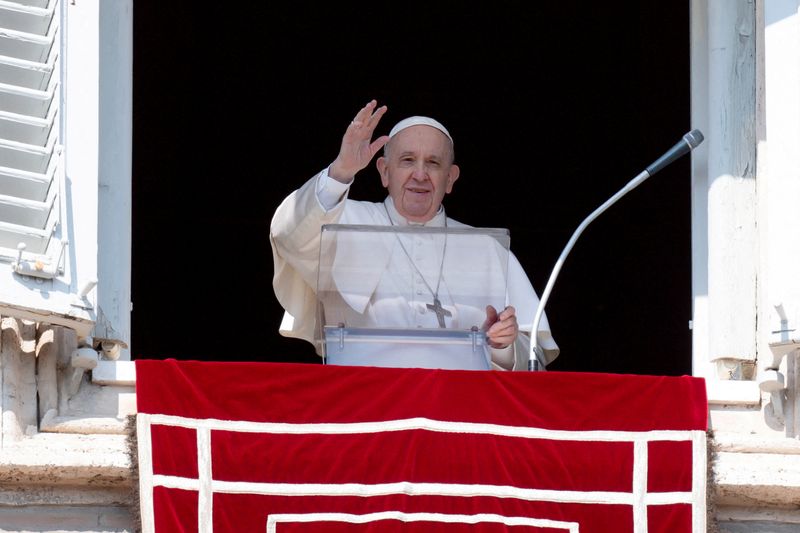By Philip Pullella
VATICAN CITY – Since the start of the war in Ukraine, Pope Francis has called out “those who make war”, condemned violation of international law, spoken of people “oppressed by bombs and fear” and lamented Ukraine as a “martyred country”.
But he has shied away from publicly using the words “Russia” or “invasion” in speaking publicly of the conflict, making him one of the few world leaders not to do so.
On Sunday he came closest to pointing a finger directly at Russia by implicitly rejecting Moscow’s use of the term “special military operation” for its invasion of Ukraine.
“In Ukraine, rivers of blood and tears are flowing. This is not just a military operation but a war which sows death, destruction and misery,” he said in his weekly address to crowds gathered in St. Peter’s Square.
But again, the R-word and the I-word were notably absent.
“This incomprehensible obstinacy of his is not good,” said an editorial on the Il Sismografo website, which specialises in Vatican and Catholic affairs.
“The rights of man, of peoples, of nations, are at play here,” the editorial said, adding that the pope should publicly call out Russian President Vladimir Putin as the aggressor and appeal to Russian Orthodox Church Patriarch Kirill, who backs Putin.
But experts say naming and shaming are not part of the Vatican’s diplomatic play book.
“These are the nuances that have been practised by Vatican diplomacy throughout the centuries,” said Victor Gaetan, author of “God’s Diplomats”, a 2021 book about Vatican diplomacy.
“You always leave room for the next conversation, for the next dialogue,” he told Reuters by telephone from Washington.
MEDIATION POSSIBILITY
On Sunday, the pope said “the Holy See is willing to do anything to put itself at the service of peace”.
Ukraine has said it would welcome Vatican mediation and Vatican Secretary of State Cardinal Pietro Parolin has said it is willing to “facilitate” dialogue”.
While the pope has not been specific, top aides have been more direct. Parolin described the war as “unleashed by Russia”, and Cardinal Leonardo Sandri, head of the Vatican department that oversees Eastern-rite Catholic Churches, called it an “unjustified invasion”.
“Lower-level officials making stronger statements than the pope is a bit of a departure from tradition but it is apparently part of the strategy,” Gaeten said.
On Feb. 25, a day after the invasion started, the pope, in an unprecedented gesture, went to the Russian embassy to the Vatican to talk to Moscow’s ambassador. No details emerged.
One complication for the Vatican is its relations with the Russian Orthodox Church.
In 2016, Francis became the first pope to meet a leader of the Russian Orthodox Church since the great schism that split Christianity into Eastern and Western branches in 1054.
Both sides have declared a willingness to work towards unity but they are still far apart theologically and over what role the papacy would play in an eventually reunited Church.
Any direct criticism by the pope of Russia or Putin could set back relations by decades and thwart a second meeting between the pope and Patriarch Kirill that both sides had hoped to hold this year, diplomats say.
POTENTIAL RELIGIOUS MINEFIELD
Of 300 million Orthodox Christians in the world, about 100 million are in Russia and more than 30 million are in Ukraine, some of those in union with the Russian Orthodox Church.
There are also about 4.5 million Byzantine-rite Catholics in Ukraine who are in allegiance with Rome. They are heavily pro-West and Vatican sources say the pope is keen to avoid anything that could lead to religious strife.
When Kirill and the pope met in Havana in 2016, they issued a joint statement deploring any hostility in Ukraine and vowed that their churches would work for social harmony in the country.
But in recent years Kirill appears to have grown increasingly closer to Putin.
On Sunday, Kirill delivered an anti-West sermon praising the people of Donbass, the separatist region in Eastern Ukraine that is backed by Moscow. He lauded them for resisting what he called sinful Western practices, such as gay pride parades.
Last week Archbishop Stanislaw Gadecki, president of the Polish Bishops Conference, sent a public letter to Kirill asking him to tell Russian soldiers “not to participate in this unjust war”, calling such a refusal “a moral obligation” before God.
Some are calling on the pope to use similarly strong language.
(The story is refiled to change ‘Western leaders’ to ‘world leaders’ in paragraph 2)
(Reporting by Philip Pullella; Editing by Nick Macfie)
